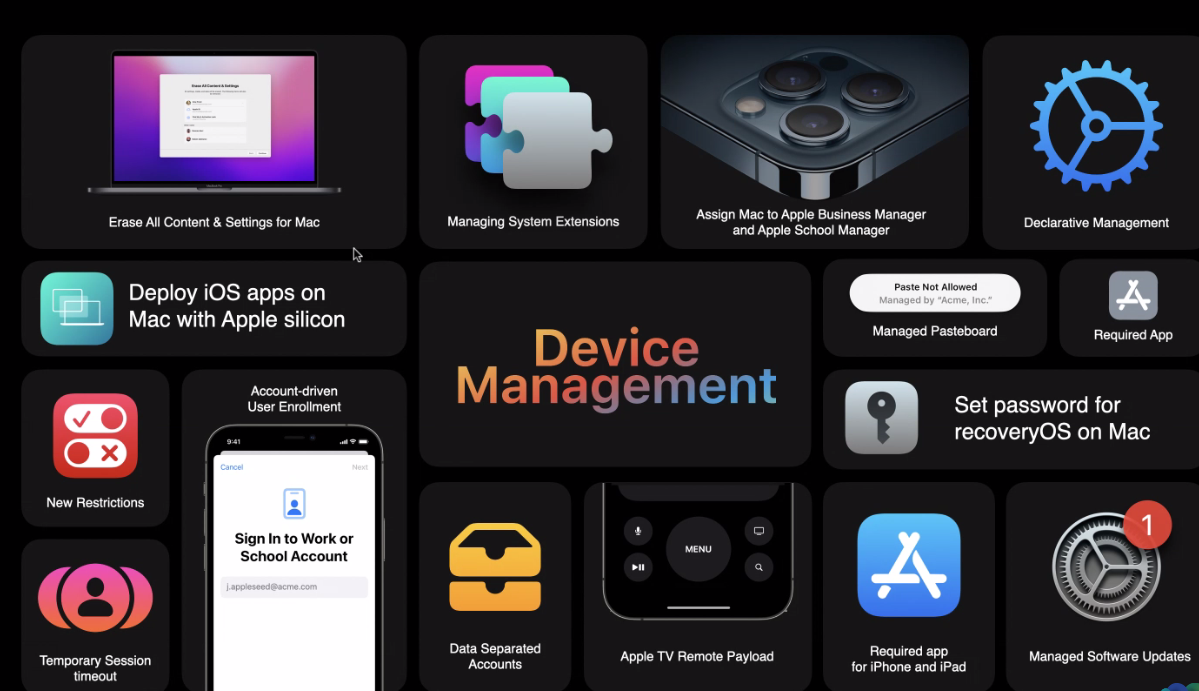

With Apple’s iPhone refresh on deck as well as a rollout of iOS 15, iPadOS 15, and MacOS Monterey, the company is adding a bevy of features designed to entice enterprise admins with easier management tools.
Rest assured that Apple’s enterprise features in its software aren’t going to get a ton of play. Unlike Samsung’s events where consumer-first devices usually include a nod to business too, Apple’s focus with its 2021 iPhone launch will be about consumer-first features.
But Apple’s enterprise play is critical. The ground war between Apple’s software and hardware platform and Android is in B2B and education. Consider a few recent headlines from Apple on the business front:
Simply put, the platform that’s less of a pain for admins and central IT will ultimately win the day. That’s why Apple is focusing on both the bring your own device employees and central device management programs. Typically, Apple’s operating system upgrades land as new iPhones are announced.
With that backdrop in mind, here’s a look at some of the key Apple additions that businesses need to know.
Mobile device management (MDM) updates and declarative management. Apple has been steadily adding features to its software to make devices easier to manage. Mobile device management companies such as Jamf then add capabilities on top of iOS.
Declarative management updates Apple’s existing protocol for device management but enables settings and status reports to be more dynamic without constant polling. Declarative management covers configurations applied to the device, assets, activations, and management and is architected to be more future-proof. Apple is also enabling iOS and iPad OS settings to require a managed pasteboard, which prevents the copy and pasting of content from an app under management to one that is not.
Must read:
Better scaling of Mac fleet management. The MDM updates also extend to MacOS and enable admins to force delayed software updates and easily erase all content and settings. Apple noted in a WWDC document:
Mac computers with Apple silicon or an Apple T2 Security Chip running macOS 12 will now allow a local administrator—or, if enrolled in MDM, an MDM administrator— to perform an Erase All Content and Settings, similar to iOS, iPadOS, tvOS, and watchOS. All user data is erased along with any additional volumes on the Mac. For a Mac with Apple silicon, the security settings are also reset to their default state (Full Security).
With the MacOS tools, Apple is aiming to make onboarding and offboarding employees easier with tools to erase hard drives and content as fast on MacOS as they can on iOS. Enterprises will be able to handle offboarding centrally.
See also: Will, your Mac, run MacOS Monterey? Check your hardware compatibility.
MacOS will also allow companies to standardize on a single deployment model wherever it is the device is purchased. Apple is also allowing Macs to be assigned to Apple Business Manager and Apple School Manager.
Tools to share iPads in business use case. Apple enables iPad OS 15 changes so retail, hospitality, and similar industries can share devices with temporary sessions.
Managed IDs and data separation for ‘bring your own device’ management. Employees can partition their personal data from what management puts on a device. Employee enrollments in BYOD scenarios enable workers to sign in with corporate accounts.
These business highlights for iOS, iPadOS, and MacOS aren’t exhaustive but should be viewed in relation to the enterprise updates in Android 12. Like the consumer market, iOS and Android are dueling for businesses and converging on approaches in many cases.
ZDNET’S MONDAY MORNING OPENER
The Monday Morning Opener is our opening salvo for the week in tech. Since we run a global site, this editorial publishes on Monday at 8:00am AEST in Sydney, Australia, which is 6:00pm Eastern Time on Sunday in the US. A member writes it of ZDNet’s global editorial board, which is comprised of our lead editors across Asia, Australia, Europe, and North America.

